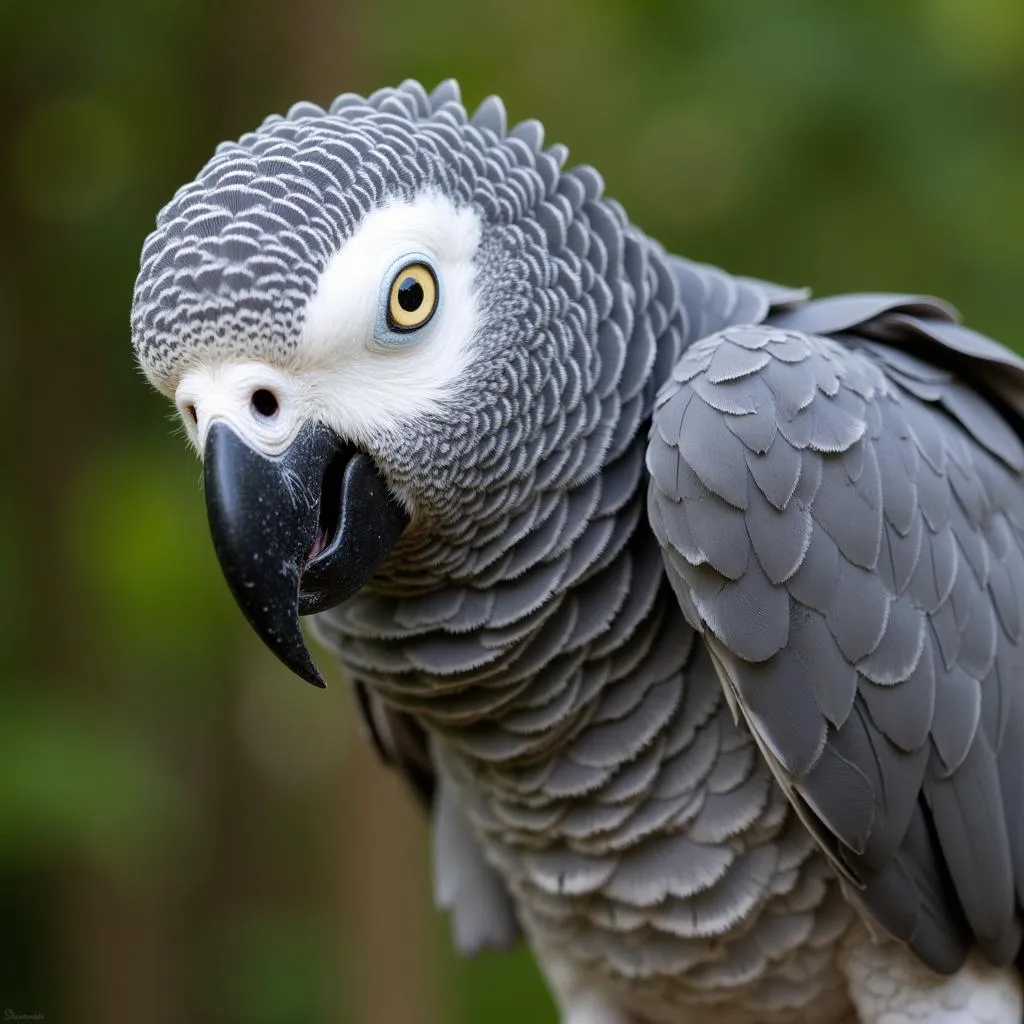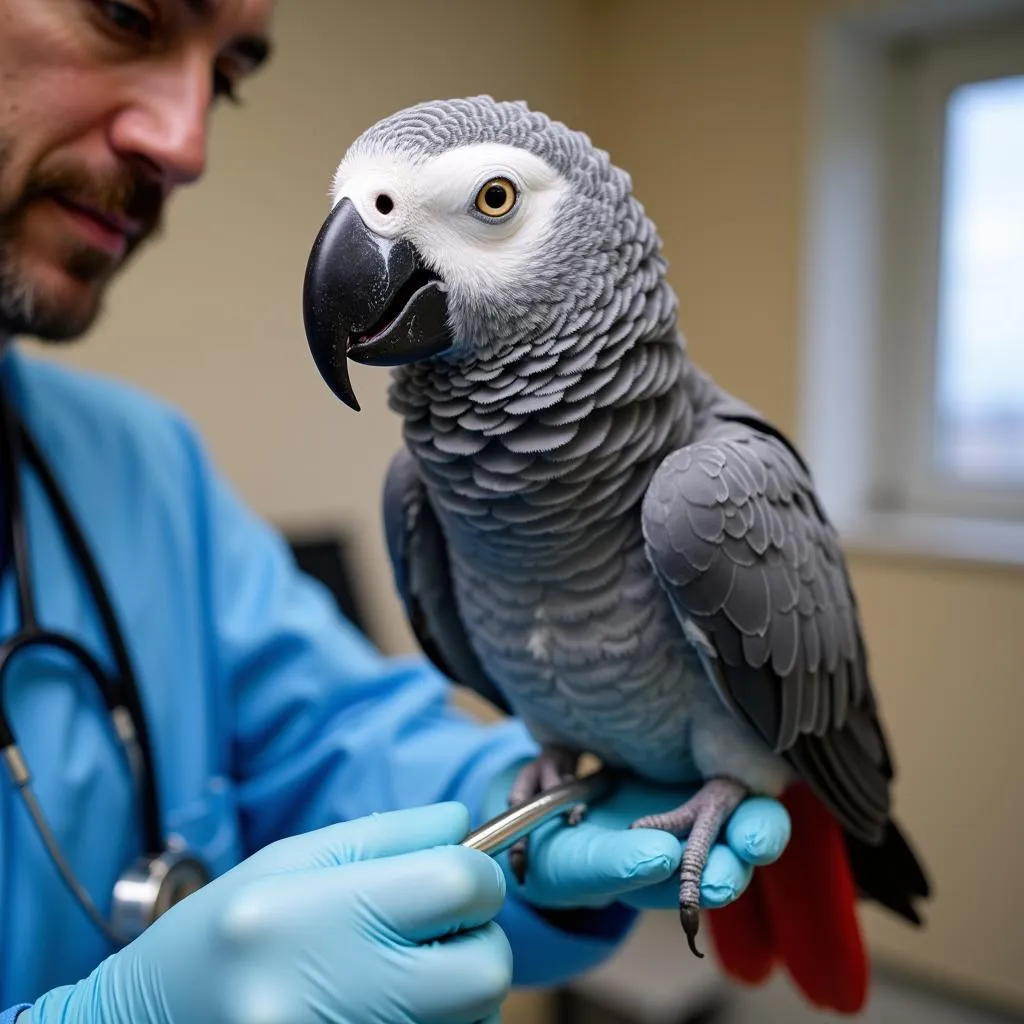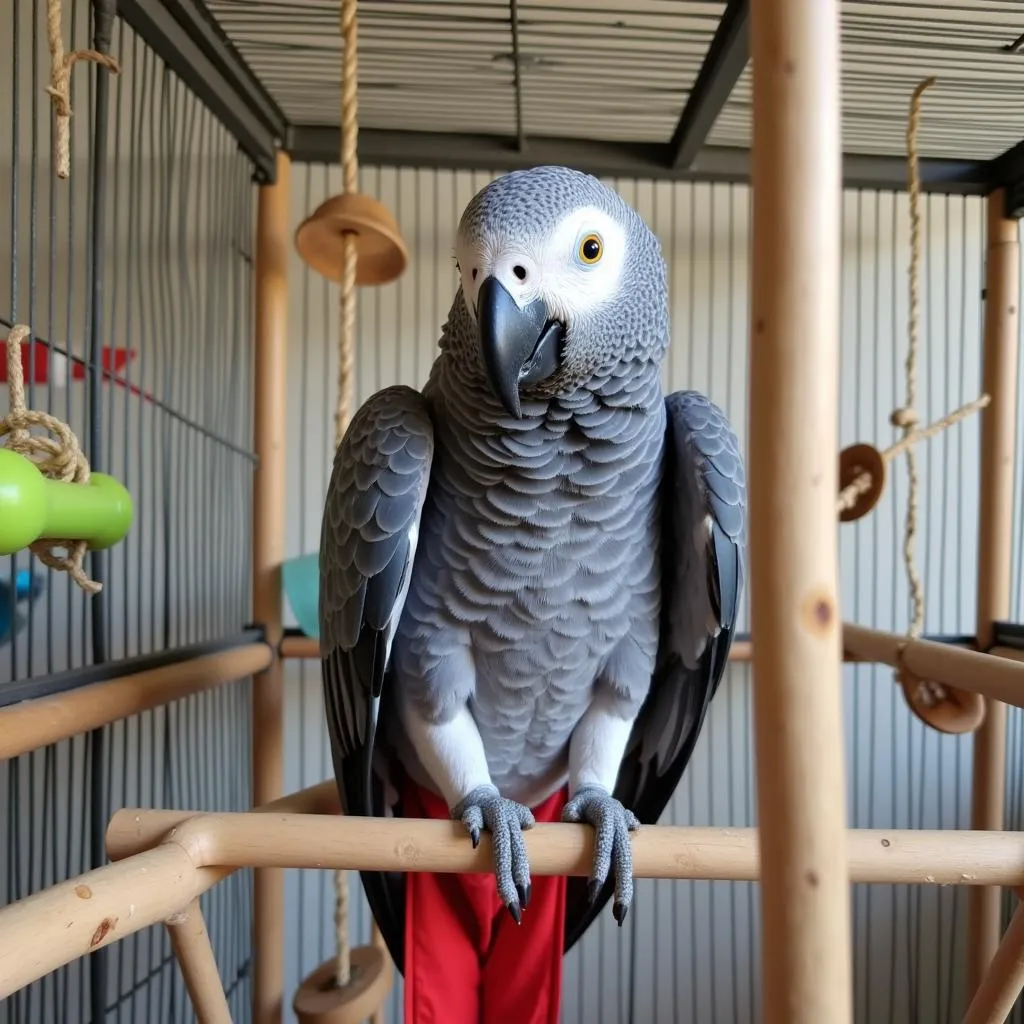African Grey Losing Feathers: Causes and Solutions
Losing feathers can be a distressing sight for any parrot owner, especially when it comes to the intelligent and social African Grey. While some feather loss is normal during molting seasons, excessive or unusual feather loss can be a sign of underlying health or behavioral issues. This article delves into the common causes of feather loss in African Greys and provides practical solutions to help your feathered friend regain their plumage and well-being.
Understanding Normal Feather Loss in African Greys
Before panicking at the sight of a few stray feathers, it’s important to understand that feather loss is a natural process in birds, just like shedding in mammals. African Greys typically undergo a molting cycle twice a year, lasting for several weeks each time. During molting, old feathers are replaced with new ones, ensuring their plumage stays healthy and vibrant.
 African Grey Molting
African Grey Molting
During molting, you might notice:
- Increased feather shedding, often in symmetrical patterns
- New pin feathers (blood feathers) emerging from the skin
- Slight changes in your bird’s mood or behavior
Common Causes of Excessive Feather Loss in African Greys
While molting is a natural and necessary process, excessive or abnormal feather loss can indicate a problem requiring attention. Several factors can contribute to this, ranging from medical conditions to environmental stressors.
1. Nutritional Deficiencies
Just like humans, African Greys need a balanced and nutritious diet to thrive. A diet lacking essential vitamins, minerals, and amino acids can lead to feather problems, including feather plucking, brittle feathers, and poor feather growth.
2. Environmental Stressors
African Greys are highly intelligent and sensitive creatures, and environmental stressors can significantly impact their physical and mental health. Factors like:
- Boredom and lack of enrichment
- Small cage size or inadequate space
- Lack of social interaction or companionship
- Loud noises or sudden changes in the environment
- Exposure to toxins or chemicals
can trigger stress-related feather picking or self-mutilation in African Greys.
3. Medical Conditions
Underlying medical conditions can also manifest as feather loss in African Greys. Some common culprits include:
- Parasite infestations: Mites, lice, and other parasites can irritate the skin and cause excessive itching, leading to feather picking.
- Bacterial or fungal infections: Skin infections can damage feather follicles and impede feather growth.
- Hormonal imbalances: Hormonal fluctuations, such as those caused by thyroid disorders, can affect feather production and quality.
- Allergies: African Greys can develop allergies to certain foods, materials, or environmental factors, leading to skin irritation and feather picking.
 African Grey at Veterinary Check-up
African Grey at Veterinary Check-up
What to Do If Your African Grey is Losing Feathers
If you notice your African Grey is losing feathers excessively or exhibiting other unusual symptoms, it’s crucial to consult an avian veterinarian immediately.
Here’s what you can do:
- Schedule a veterinary check-up: An avian veterinarian can help diagnose the underlying cause of feather loss through physical examinations, blood tests, and other diagnostic tools.
- Review your bird’s diet: Ensure your African Grey is receiving a balanced and varied diet that includes fresh fruits, vegetables, high-quality pellets formulated for African Greys, and occasional healthy treats.
- Enrich your bird’s environment: Provide ample mental and physical stimulation through:
- A spacious cage with plenty of room for climbing, swinging, and playing.
- A variety of toys, such as foraging toys, puzzle toys, and destructible toys, to prevent boredom.
- Regular interaction and playtime with you or other bird companions.
- Manage stress: Minimize stressors in your bird’s environment by:
- Keeping the cage in a quiet and secure area away from loud noises, drafts, or direct sunlight.
- Maintaining a consistent routine for feeding, playtime, and sleep.
- Introducing new changes gradually and positively.
- Follow your veterinarian’s recommendations: If an underlying medical condition is diagnosed, strictly adhere to your veterinarian’s prescribed treatment plan.
Preventing Feather Loss in African Greys
Preventing feather loss in African Greys involves a multi-faceted approach focusing on providing a nurturing environment, a balanced diet, and regular veterinary care:
- Offer a species-appropriate diet: A balanced and nutritious diet is crucial for maintaining healthy feather growth. Consult an avian veterinarian for dietary recommendations specific to your bird’s age, health condition, and activity level.
- Provide a stimulating environment: An enriched environment keeps African Greys mentally and physically stimulated, reducing the likelihood of boredom-related feather picking. Rotate toys regularly, offer foraging opportunities, and provide ample space for exercise.
- Schedule regular veterinary check-ups: Early detection and treatment of medical conditions can prevent feather loss and other health complications. Regular check-ups also allow your veterinarian to monitor your bird’s overall health and address any potential issues promptly.
 Healthy African Grey in Enriched Cage
Healthy African Grey in Enriched Cage
Conclusion
Feather loss in African Greys can be a complex issue with various underlying causes. By understanding the common factors contributing to feather loss and taking proactive steps to address them, you can help ensure your feathered companion enjoys a long, healthy, and vibrant life with a full and beautiful plumage. Remember, early intervention is key, and consulting an avian veterinarian is crucial at the first sign of excessive or unusual feather loss.
FAQs
Q: How can I tell if my African Grey is molting or experiencing abnormal feather loss?
A: Molting typically involves symmetrical feather loss, while abnormal feather loss may appear patchy or concentrated in specific areas. Additionally, molting is usually accompanied by the growth of new pin feathers, while abnormal feather loss might not show new feather growth.
Q: What are some healthy treats I can offer my African Grey?
A: Healthy treats for African Greys include small pieces of fresh fruits like apple slices, berries, or melon, as well as vegetables like cooked sweet potato, broccoli, or leafy greens. Nuts like almonds or walnuts, offered in moderation, can also be a good source of healthy fats.
Q: How often should I take my African Grey to the veterinarian?
A: It’s recommended to schedule annual check-ups for healthy African Greys and more frequent visits if your bird has any pre-existing medical conditions or shows signs of illness.
Q: Can stress really cause my African Grey to lose feathers?
A: Yes, stress is a common trigger for feather picking and self-mutilation in African Greys. These intelligent and sensitive birds can experience stress from various factors, including boredom, loneliness, environmental changes, or underlying medical conditions.
Q: What should I do if I suspect my African Grey is allergic to something?
A: If you suspect an allergy, it’s essential to consult an avian veterinarian for proper diagnosis and treatment. They can help identify potential allergens and recommend appropriate changes to your bird’s environment, diet, or lifestyle.
Need further assistance? Contact us:
Phone: +255768904061
Email: kaka.mag@gmail.com
Address: Mbarali DC Mawindi, Kangaga, Tanzania.
Our dedicated customer care team is available 24/7 to address your concerns and provide guidance on caring for your African Grey. You can also explore our website for additional resources and articles on various aspects of African Grey parrot care, including:
We are committed to helping you provide the best possible care for your feathered companion.

